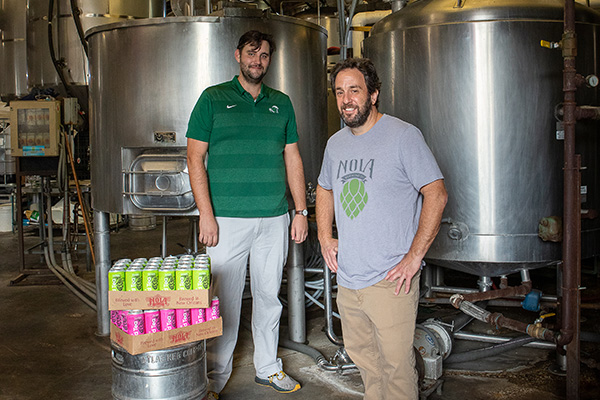
Lepage Strategic Adviser Chris Flowers (MBA ’21), left, and Doug Walner (A&S’91), owner and executive chairman of NOLA Brewing Co., at the company’s Tchoupitoulas Street brewing facility.
In early March, Tulane University’s spring 2020 semester was off to a great start. After the Mardi Gras break, students at the A. B. Freeman School of Business were turning their attention toward summer internships, and those who were set to graduate were focused on the job hunt. The economy was booming, so companies were hiring, and many students had already secured job offers.
By the end of the month, however, a new and deadly virus brought everything to a halt. The COVID-19 pandemic shut down not only university life but much of the economy as well. Students who had secured jobs and internships saw those offers rescinded as companies scrambled to cut costs any way they could. At the same time, many small businesses lacked the resources to hire the skilled workers they needed to respond to the pandemic.
After watching the situation unfold for a few weeks, the team at the Freeman School’s Albert Lepage Center for Entrepreneurship and Innovation envisioned a way to help bridge the gap.
Inspired by the success of the IDEAcorps program, which connected MBA students with New Orleans businesses in need of assistance following Hurricane Katrina, Lepage Center Executive Director Rob Lalka conceived a program that would connect students and recent graduates whose job offers had been rescinded with local businesses critically in need of assistance due to the pandemic.
Albert Lepage (MBA ’71), the retired co-chairman of Lepage Bakeries and a longtime supporter of entrepreneurship and small businesses, provided a generous gift to help make the program a reality.
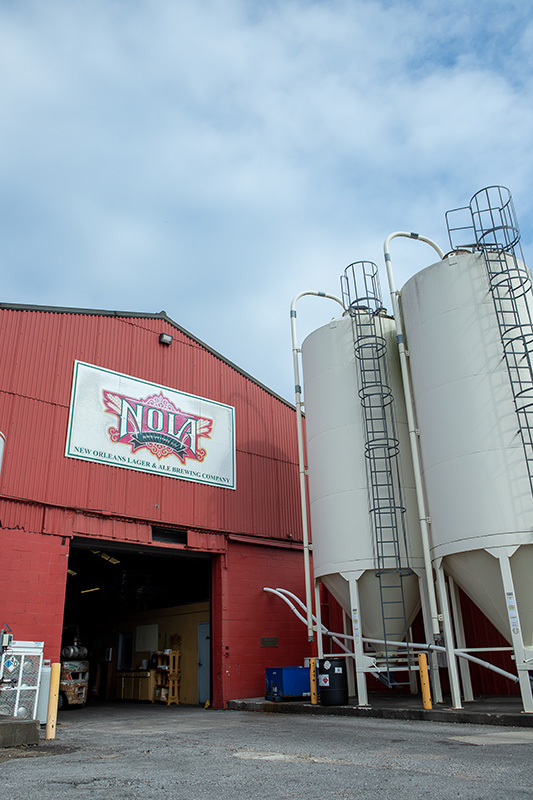
At its Tchoupitoulas Street facility, NOLA Brewing Co. produces more than a dozen different year-round and seasonal brews, including LA Lager, NOLA Blonde Ale, Revivalists Pale Ale and Hopitoulas IPA.
On April 24, the Freeman School announced the launch of the Lepage Strategic Advisers Program. Funded through a gift from Lepage, the program would provide paid positions to students and new graduates interested in working with local entrepreneurs impacted by the pandemic. Strategic advisers would work for the businesses virtually on a fulltime basis for up to 10 weeks, providing immediate support based on each business’s specific needs.
The response was overwhelming. The Lepage Center received applications from more than 60 students and 50 local businesses seeking to participate in the program. In the end, the Lepage Center selected 10 students and 12 companies.
While economies across the nation were suffering, the Greater New Orleans region, with its dependence on hospitality and tourism, was hit particularly hard. Adrian Mendez (MBA ’14), business and strategy director with Bacchanal Wine and the Elysian Bar, was one of those hospitality professionals forced to grapple with difficult questions.
“What we’re trying to decipher is not only how do we stay safe and how do we keep our staff and guests safe, but also we know we have to rethink and adopt a new business model,” Mendez said. “We’ll need to update our practices, update our operations, update our strategy and just how we look at everything.”
Through the Lepage Strategic Advisers Program, Mendez was paired with Josh Lacoste (BSM ’20), who helped Mendez research potential pivots for the business. Over the course of his 10 weeks, Lacoste listened in on earnings calls at large hospitality firms to find out how they were managing the crisis and interviewed Freeman alumni working in hospitality to learn their best practices.
Businesses outside hospitality were also feeling the effects of the pandemic. Vignesh Krishnan (MBA ’10), founder and CEO of recent startup SampleChain, is building a software product for the market research industry. While his industry wasn’t directly impacted in the same way as hospitality, his business suffered from cautious investors, lenders and clients.
“The main situation with the pandemic is confidence,” Krishnan said. “When some parts of the economy are unsure, that kind of spreads.”
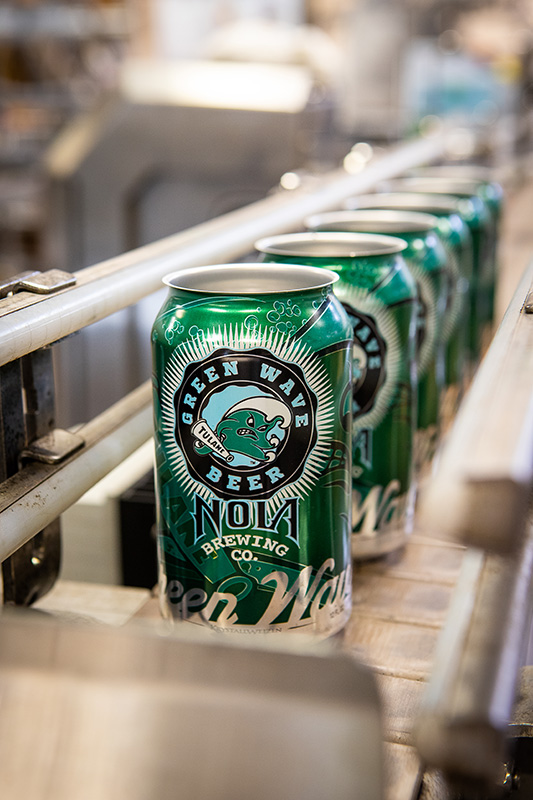
Before the COVID-19 lockdown, Green Wave Beer was a top seller at Tulane athletic events.
Doug Walner (A&S ’91), owner and executive chairman of NOLA Brewing Co., a New Orleans-based craft brewery founded in 2008, gathered himself after the initial shock of the shutdowns to apply for the program. A large portion of NOLA Brewing’s revenue came directly from sales to restaurants and bars, which were shuttered during the pandemic, and while the brewery did have product on the shelves at grocery stores, it wasn’t moving at the rate Walner hoped.
“When the country is immediately thrust into a recession, high-price craft beer isn’t the first beer people reach for on the shelves,” Walner said. It was time to try something new. Even before the pandemic, NOLA Brewing had plans to launch its first non-alcoholic product, a sparkling tea brewed with hops. The plan was to launch after Mardi Gras, during the Lenten season, when many Louisianians cut back their alcohol consumption.
“We thought it was good timing,” Walner said.
Normally it would have been.
“But with these types of products, being out in grocery stores and giving out samples is a big part of your launch strategy,” Walner said, and that was impossible during the pandemic.
So NOLA Brewing decided to focus instead on online sales, which was a totally new avenue for the company. When Walner was matched with strategic adviser Chris Flowers (MBA ’21), he jumped at the chance to have someone with an MBA skillset work with his team. Walner tasked Flowers with being the project manager for NOLA Brewing’s Sparkling Hop’d Tea during the 10 week period of the program.
“We asked him to do all the research and heavy lifting,” Walner said. “You know, how do we get an online fulfillment store running?”
To accomplish this, Flowers took on all aspects of the project, from spec writing to branding to financial analysis. To get it done, he had to manage a team of other professionals.
“This experience helped me refine my skill set when it comes to taking a 30,000-foot view from senior leadership and translating it to the designers, web builders, distributers and manufacturers,” Flowers said. “I had to help them understand where we’re trying to head in five years while also making sure we have product to sell in five months.” Flowers, who grew up in New Orleans, was a senior in high school when Katrina hit. He says he drew some inspiration from that period of his life to get through this difficult time in his graduate studies. “I’m a firm believer that in any situation that you’re thrown in, if you don’t try to make the best of it, it’s going to get the better of you,” he said.
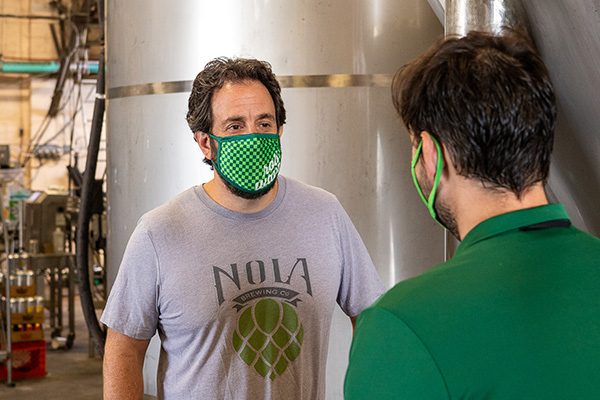
Today, thanks in great part to Flowers’ work, NOLA Brewing’s Sparkling Hop’d Tea — in both Oolong and Rose-Hip Hibiscus flavors — is available for purchase on NOLA Brewing’s website as well as at stores including Rouse’s, Dorignac’s and Martin Wine Cellar.
“It was great to have somebody with Chris’ skills working for us,” Walner said. “It was a complex project and he was able to manage all the various players to keep us moving forward over the 10-week period.”
WHEN HE HEARD ABOUT about the Lepage Strategic Advisers Program, Jalees Khalid (MBA ’17), director of sales and marketing at InnoGenomics Technologies, knew immediately the program would be a good fit for the New Orleans-based forensics and genetic testing company.
“We have 12 staff, and I’m the only one who is focused on the business side of things,” he said. “So that means that any sort of market research, advertising, website redevelopment — anything at all on the business side — flows through me. We had a lot of projects that just kept getting pushed aside.”
And this was a good time to tackle some of those projects, since business was slower than usual.
InnoGenomics developed and sells a number of DNA test kits that provide law enforcement agencies with cost-effective solutions.
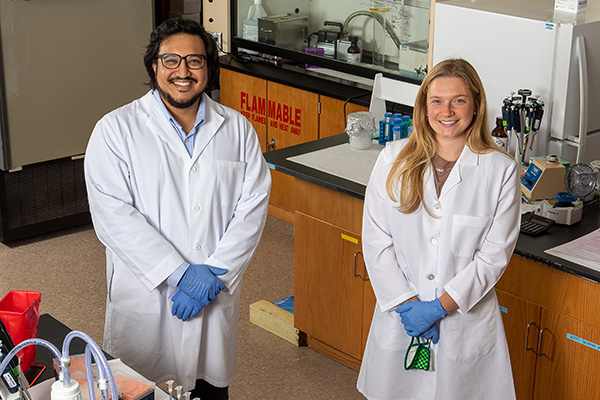
Jalees Khalid (MBA ’17), left, sales and marketing director with InnoGenomics Technologies, worked with Lepage Strategic Adviser Gabi Marcus (BSM ’20, MMG ’21), right, to expand the company’s marketing efforts and redesign its website.
“We typically sell to crime labs, and because of COVID-19, a lot of crime labs have had to limit the number of staff that are actually on site, which means they are doing less casework, which means they’re buying less of our products,” Khalid said. “A lot of our products are kind of on the cutting edge of technology. They’re not really widely adopted yet, so a lot of times, we have to get a crime lab to try our product first. If there’s not extra bandwidth, then there’s really no way for them, in addition to doing all their normal casework, to try a new product as well.”
After indicating to the Lepage Center he needed help primarily in marketing, Khalid was paired up with strategic adviser Gabi Marcus (BSM ’20, MMG ’21), who had strong marketing experience in the apparel and consumer packaged goods industries.
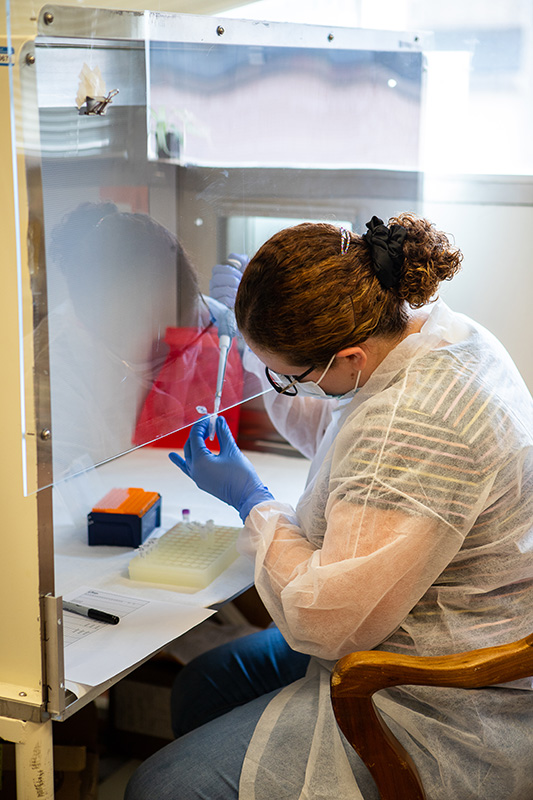
Associate scientist Clara Krzykwa measures DNA extract volume in an isolated hood to prevent contamination.
“Having been through the MBA program myself and being acquainted with the business school, I knew what level of a student we’d be getting, and I had confidence that we’d be able to get a lot of value out of the experience, even if they didn’t have a science background,” Khalid said. Initially, however, Marcus wasn’t so sure. She worried that her lack of science experience would make it difficult to contribute.
“I’ve never really considered myself to be good at math or science, so it was an added fear factor,” she said. “It was very intimidating to go into this position and have this company trust me with their work.” She was afraid she wouldn’t be able to deliver.
But Khalid had a plan to help her get acquainted with InnoGenomics’s market and products. He asked her to start with some market research. Marcus helped Khalid identify alternative markets for InnoGenomics’ newest product, Sperm X, a DNA extraction kit that offers higher male DNA yields than conventional methods. Along the way, Marcus asked questions and slowly learned the technology.
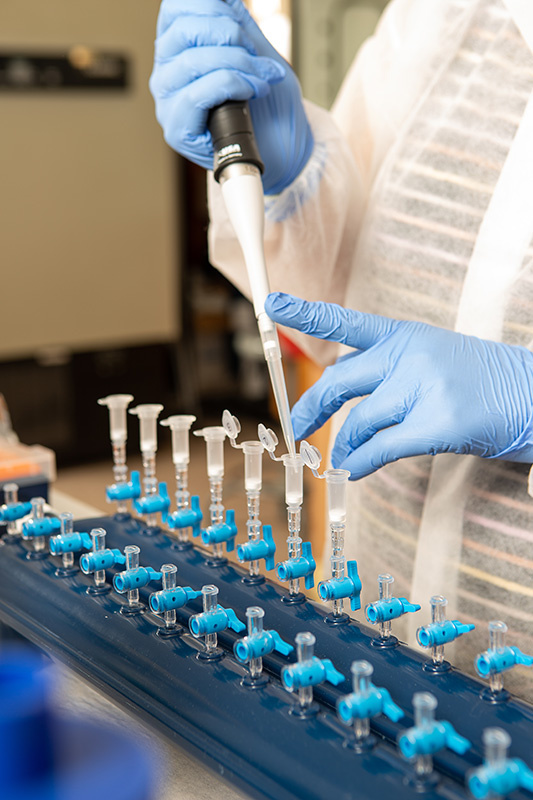
Preparing biological samples for DNA purification through vacuum filtration.
Despite the initial learning curve, Khalid says Marcus was able to provide a lot of value for InnoGenomics.
“She helped us with an advertising and marketing strategy for the new product,” he said. “We gave her a budget of $10,000 – $15,000 and she created a strategy using SEO, LinkedIn and Facebook. She also helped us find publications we could advertise in.”
Khalid says Marcus also helped him develop a plan for InnoGenomics’s website redesign, a project he knew was important
but had been pushing aside.
“She talked to us to see what we wanted out of a website, looked at our competitors and went through all our existing pages to see what actually made sense and what didn’t,” Khalid said. “She created a document with colors, layout and what sorts of information we should have on each page.”
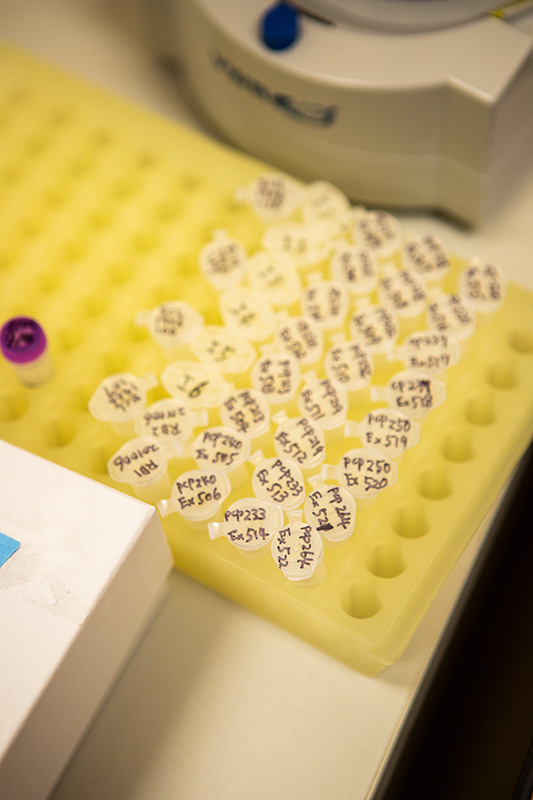
Genomic and cell free DNA extracts which have been isolated and purified for downstream applications.
Khalid says he was able to take the document directly to web designers for quotes and that Marcus’s work substantially moved the website redesign timeline forward.
For her part, Marcus says she gained a great deal of confidence in applying her marketing expertise to an unfamiliar industry. While previously she might have been afraid to apply for a marketing job in the sciences, Marcus says she now realizes her skills are more broadly applicable than she thought.
“Sometimes the best way to learn is to be uncomfortable,” she said. In addition to learning on the job, the Lepage Strategic Advisers had the chance to learn from one another during regular video discussions. Each week they all read the same group of
articles and got together to discuss them with Lepage Center staff. These discussions enabled them to build a rapport. At one point, Marcus even reached out to Flowers for help with her marketing strategy.
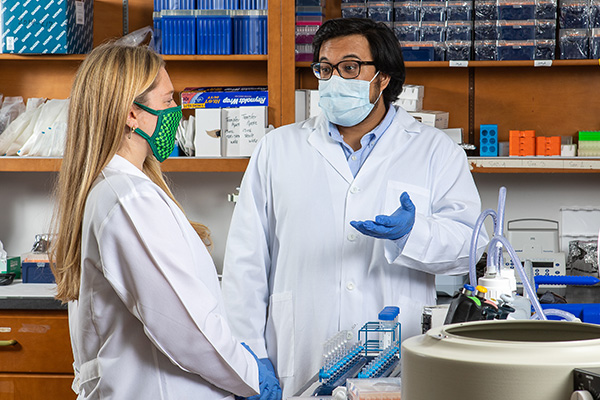
“I reached out to the group and asked if anyone had experience with marketing strategies,” Marcus said. “Chris gave me really good advice. He taught me that Facebook can be a really good tool because you do get so much data about your customers or the people looking at your products.”
Marcus and Flowers both say they enjoyed learning from the other advisers in this virtual environment.
“It was really nice to get to know other people who are experiencing something similar to what you’re experiencing,” Marcus said.
At the end of the program, four of the companies offered full or part-time jobs to their strategic advisers. While some advisers ultimately decided to pursue other opportunities, two decided to stay on. One of those was Sean Tillery (MBA ’21), who worked with Krishnan at SampleChain.
“When you work with good people, you want to continue working with them, and the Tulane MBA was an added bonus,” said Krishnan. “Sean’s skills in business development and investor relations made him a valuable part of our team.”
Ann Marshall Tilton (MBA ’17) is community engagement manager at the Albert Lepage Center for Entrepreneurship and Innovation.

